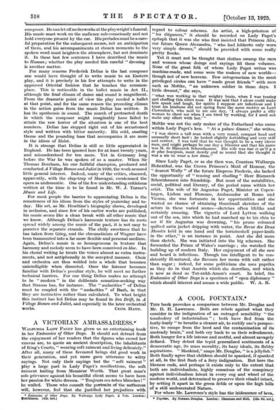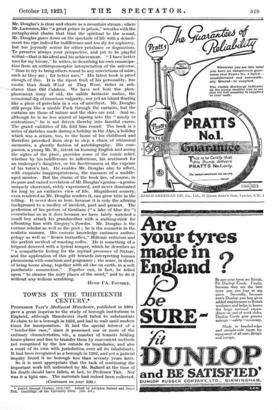A COOL FOUNTAIN.*
Tina book provokes a comparison between Mr. Douglas and Mr. D. H. Lawrence. Both are rebels against what they consider in the indignation of an outraged sensibility "the tomfoolery of industrialism " ; both have fled from the hurly-burly "to breathe a cleaner air, to rectify one's perspec- tive, to escape from the herd and the contamination of its unsteady brain," and both cry back to us their refreshment. Both hunger for a life intense and zestful, and almost savagely defined. They detest the tepid generalized sentiments of a democratic age, its mass morality, its hazy ideals, its flabby aspirations. "Mankind," snaps Mr. Douglas, "is a jellyfish." Both finally agree that children should be spanked, if spanked at all, in the first flush of a fiery indignation. But here the likeness ends, and perhaps it exists only to the extent that both are individualists, highly conscious of the conspiracy against individualism latent in every cog and wheel of the modern world, and determined to preserve their citadel intact, by setting it apart in the green fields or upon the high hills of a still undesecrated Nature.
For where Mr. Lawrence's style has the iridescence of lava,
• Together. By Norman Douglas. London Chapman and Hall. [Lb. 65, neta,
Mr. Douglas's is dear and chaste as a mountain stream; where Mr. Lawrence, like "a great prince in prison," wrestles with the metaphysical chains that bind the spiritual to the sexual, Mr. Douglas gazes down on the spectacle of life with a detach- ment too ripe indeed for indifference and too sly for sophistry, but too joyously serene for either petulance or dogmatism. To preserve always your perspective, and yet to be playful withal—that is his ideal and his achievement. "I have better uses for my leisure," he writes, in describing his own emancipa- tion from an anthropomorphic interpretation of the universe, "than to try to bring others round to any convictions of mine, such as they are ; far better uses." His latest book is proof enough of this. It is the ripest fruit of his personality, less exotic than South Wind or They Went, richer in sub-
-----stance stance than Old Calabria. We have not here the phos- phorescent irony of old, the subtle fantastic malice, the occasional dig of conscious vulgarity, nor yet an island floating like a piece of porcelain in a sea of amethyst. Mr. Douglas still peeps like a nimble Puck through the curtains, but the curtains are those of nature and the skies are real. And so, although he is no less scared of lapsing into the "musty or sententious," he is not driven thereby into fanciful excess. The grand validities of life fold him round. The book is a series of sketches made during a holiday in the Alps, a holiday which was a return, too, to the home of his childhood and therefore provoked from step to step a chain of whimsical memories, a ghostly fashion of autobiography. His com- panion, a young Mr. R., intent on learning English and seeing the sights of the place, provides some of the comic relief, whether by his indifference to inflections, his sentiment for an innkeeper's daughter, or his facetiousness at the expense of his tutor's hat. He enables Mr. Douglas also to affect, with exquisite inappropriateness, the manners of a middle- aged mentor. But the charm of the book lies, of course, in its pure and varied revelation of Mr. Douglas's genius—a genius uniquely observant, richly experienced, and never dominated for long by an exclusive view of life. Magnificent scenery, even rendered as Mr. Douglas renders it, can grow trite in the telling. It never does so here, because it is only the alluring background to a medley of incident, past and present. The perfection of his picture of Gentians (" a lake of blue fire ") overwhelms us as it does because we have lately watched a small boy attack his grandmother with a walking-stick for affronting him with Gregory's Powder. Mr. Douglas is the curious scholar as well as the poet ; he is the romantic in the realistic manner. His esoteric knowledge embraces anthro- pology as well as "frozen butterflies," Miltonic criticism and the perfect method of roasting coffee. He is something of a brigand dowered with a lyrical temper, which he describes as "a sympathetic feeling for the myriad processes of Nature, and the application of this gift towards interpreting human phenomena with concision and poignancy ; the sense, in short, of being borne along, together with all else on earth, in a soft pantheistic commotion." .Together can, in fact, be relied upon "to cleanse the miry places of the mind," and to do it without any tedious scrubbing.
HUGH I'A. FAUSSET,



























































 Previous page
Previous page